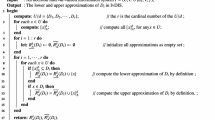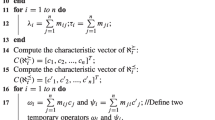Abstract
With the development of society, data noise and other factors will cause the incompleteness of information systems. Objects may increase or decrease over time in information systems. The classical information system can be extended to the incomplete interval-valued decision information system (IIDIS) that is the researching object of this paper. Incremental learning technique is a significant method for solving approximate sets under dynamic data. This article defines a multi-threshold tolerance relation based on the set pair analysis theory and establishes a rough set model in IIDIS. Then, several methods and algorithms for statically/dynamically solving approximate sets are shown. Finally, comparative experiments from six UCI data sets show both dynamic algorithms take less time than the static algorithm to calculate the approximate sets no matter how object set changes.




Similar content being viewed by others
References
Pawlak Z (1982) Rough sets. Int J Comput Inf Sci 11(5):341–356
Pawlak Z (1991) Rough sets: theoretical aspects of reasoning about data. Kluwer Academic Publishers, Dordrecht
Pawlak Z (1998) Rough set theory and its applications to data analysis. Cybern Syst 29(7):661–688
Xu WH, Guo YT (2016) Generalized multigranulation double-quantitative decision-theoretic rough set. Knowl Based Syst 105(1):190–205
Xu WH, Yu JH (2017) A novel approach to information fusion in multi-source datasets: a granular computing viewpoint. Inf Sci 378:410–423
Xu WH, Li WT (2016) Granular computing approach to two-way learning based on formal concept analysis in fuzzy datasets. IEEE Trans Cybern 46(2):366–379
Dai JH, Wang WT, Mi JS (2013) Uncertainty measurement for interval-valued information systems. Inf Sci 251(4):63–78
Dai JH, Wang WT, Xu Q, Tian HW (2012) Uncertainty measurement for interval-valued decision systems based on extended conditional entropy. Knowl Based Syst 27(3):443–450
Dai JH, Wei BJ, Zhang XH, Zhang QL (2017) Uncertainty measurement for incomplete interval-valued information systems based on \(\alpha \)-weak similarity. Knowl Based Syst 136:159–171
Zhang N, Miao DQ, Qian J (2011) Knowledge granulation, rough entropy and information entropy in interval-valued information systems. J Comput Inf Syst 7(11):4129–4136
Sun BZ, Ma WM, Gong ZT (2014) Dominance-based rough set theory over interval-valued information systems. Expert Syst 31(2):185–197
Dai JH, Hu H, Zheng GJ, Hu QH, Han HF, Shi H (2016) Attribute reduction in interval-valued information systems based on information entropies. Front Inf Technol Electron Eng 17(9):919–928
Zhang X, Mei CL, Chen DG, Li JH (2014) Multi-confidence rule acquisition and confidence-preserved attribute reduction in interval-valued decision systems. Int J Approx Reason 55(8):1787–1804
Qian YH, Liang JY, Li DY, Zhang HY, Dang CY (2008) Measures for evaluating the decision performance of a decision table in rough set theory. Inf Sci 178(1):181–202
Li JH, Mei CL, Lv YJ (2011) Knowledge reduction in decision formal contexts. Knowl Based Syst 24(5):709–715
Zhang XY, Xu WH (2011) Lower approximation reduction in ordered information system with fuzzy decision. Appl Math 02(7):918–921
Yang XB, Yu DJ, Yang JY, Wei LH (2009) Dominance-based rough set approach to incomplete interval-valued information system. Data Knowl Eng 68(11):1331–1347
Polkowski L, Skowron A, Zytkow J (1994) Rough foundations for rough sets. In: Proceedings of the third international workshop on rough sets and soft computing (RSSC’94), San Jose State University, CA, 10–12 November, 1994, pp 142–149
Polkowski L, Skowron A, Zytkow J (1995) Rough foundations for rough sets. In: Lin TY, Wildberger AM (eds) Soft computing. Simulation Councils Inc, San Diego, pp 55–58
Skowron A, Stepaniuk J (1996) Tolerance approximation space. Fundam Inform 27(2–3):245–253
Xu WH, Li MM, Wang XZ (2017) Information fusion based on information entropy in fuzzy multi-source incomplete information system. Int J Fuzzy Syst 19(4):1200–C1216
Stefanowski J, Tsoukis A (2000) Valued tolerance and decision rules. In: Rough sets and current trends in computing, pp 212–219
Liang GY, Xu ZB (2008) The algorithm on knowledge reduction in incomplete information systems. Int J Uncertain Fuzziness Knowl Based Syst 10(01):95–103
Xu ZS, Cai XQ (2009) Incomplete interval-valued intuitionistic fuzzy preference relations. Int J Gen Syst 38(8):871–886
Cai MJ, Li QG, Ma JM (2015) Knowledge reduction of dynamic covering decision information systems caused by variations of attribute values. Int J Mach Learn Cybern 8(4):1131–1144
Li SY, Li TR (2015) Incremental update of approximations in dominance-based rough sets approach under the variation of attribute values. Inf Sci 294:348–361
Yu JH, Xu WH (2017) Incremental knowledge discovering in interval-valued decision information system with the dynamic data. Int J Mach Learn Cybern 8(1):849–864
Yu JH, Xu WH (2015) Incremental computing approximations with the dynamic object set in interval-valued ordered information system. Fundam Inform 142(1–4):373–397
Luo C, Li TR, Chen HM, Liu D (2013) Incremental approaches for updating approximations in set-valued ordered information systems. Knowl Based Syst 50(50):218–233
Li Y, Jin YF, Sun XD (2018) Incremental method of updating approximations in DRSA under variations of multiple objects. Int J Mach Learn Cybern 9(2):295–308
Li SY, Li TR, Liu D (2013) Incremental updating approximations in dominance-based rough sets approach under the variation of the attribute set. Knowl Based Syst 40(1):17–26
Jing YG, Li TR, Huang JF, Zhang YY (2016) An incremental attribute reduction approach based on knowledge granularity under the attribute generalization. Int J Approx Reason 76:80–95
Li TR, Ruan D, Geert W, Song J, Xu Y (2007) A rough sets based characteristic relation approach for dynamic attribute generalization in data mining. Knowl Based Syst 20(5):485–494
Hu J, Li TR, Chen HM, Zeng AP (2015) An incremental learning approach for updating approximations in rough set model over dual universes. Int J Intell Syst 30(8):923–947
Huang YY, Li TR, Horng SJ (2015) Dynamic maintenance of rough fuzzy approximations with the variation of objects and attributes. In: Yao YY, Hu QH, Yu H, Grzymala-Busse JW (eds) Rough sets, fuzzy sets, data mining, and granular computing. Lecture notes in computer science. Springer, Cham, pp 173–184
Jaccard P (1912) The distribution of flora in the alpine zone. N Phytol 11(2):37–50
Zhao KQ (1994) Set pair analysis and preliminary application. Explor Nat 1:67–72 (in Chinese)
Zeng L, He PY, Fu M (2013) Attribute reduction algorithm based on rough set in incomplete interval-valued information. J Nanjing Univ Sci Technol 37(4):524–529 (in Chinese)
Acknowledgements
We would like to express our thanks to the Editor-in-Chief, handling associate editor and anonymous referees for his/her valuable comments and constructive suggestions. This paper is supported by the National Natural Science Foundation of China (Nos. 61472463, 61772002) and the Fundamental Research Funds for the Central Universities (No. XDJK2019B029).
Author information
Authors and Affiliations
Corresponding author
Additional information
Publisher's Note
Springer Nature remains neutral with regard to jurisdictional claims in published maps and institutional affiliations.
Rights and permissions
About this article
Cite this article
Lin, B., Zhang, X., Xu, W. et al. Dynamically updating approximations based on multi-threshold tolerance relation in incomplete interval-valued decision information systems. Knowl Inf Syst 62, 1063–1087 (2020). https://doi.org/10.1007/s10115-019-01377-8
Received:
Revised:
Accepted:
Published:
Issue Date:
DOI: https://doi.org/10.1007/s10115-019-01377-8




